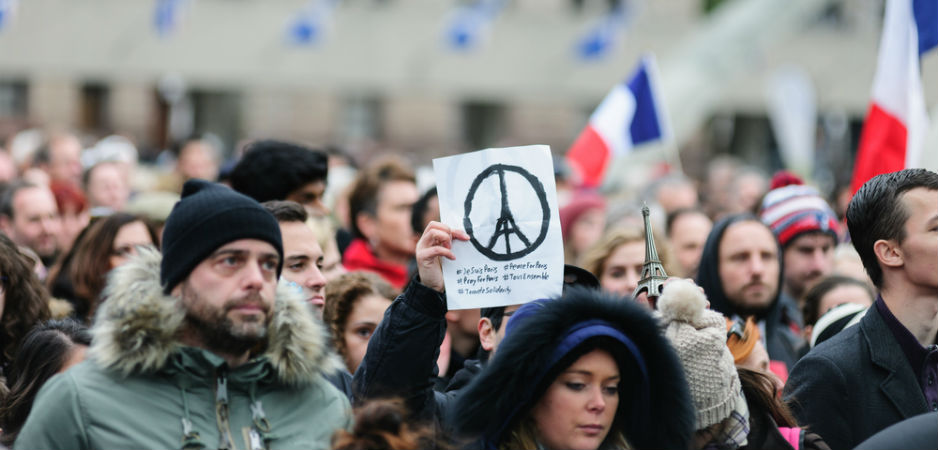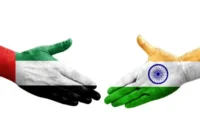Turmoil leads to terror, which is merely a symptom of the deep disaffection and the disintegration of the political, economic and social fabric.
This week, three terrorist attacks shook the world. In Lebanon, the Islamic State (IS) carried out a deadly attack in the Shia-dominated southern Beirut, killing at least 43 people and injuring more than 200. In Iraq, a suicide bomber blew himself up at the funeral of a pro-government Shia fighter in Baghdad, killing at least 21 people and injuring 46. In France, IS carried out its most spectacular attack in Paris. A series of shootings, bombings and hostage taking have resulted in 129 dead and more than 350 wounded.
In January, Islamist terrorists carried out attacks in both France and Nigeria. This week, the attacks in Paris have been of a different scale altogether. Not since World War II has the French capital experienced such violence. In Europe, an attack of this magnitude has not taken place since the Madrid train bombings of 2004. French President François Hollande has declared it to be “an act of war that was waged by a terrorist army, a jihadist army, by Daesh, against France.” It is important to note that Hollande referred to IS by its Arabic acronym. He went on to declare, “France, because it was freely, cowardly attacked, will be merciless against the terrorists,” and that la grande nation “will triumph over barbarism.”
France is in a state of shock. This great European power with its legendary Gallic pride has woken up to discover that large-scale violence is not the monopoly of revolution and war. US President Barack Obama, German Chancellor Angela Merkel and others have pledged support for France. Buildings around the world were lit up in the French tricolor and sympathy is not in short supply. The Pavlovian media reaction worldwide is an unremitting focus on Paris alone. The same cannot be said for the dead in Beirut or Baghdad. Arab lives are clearly neither as valuable nor as worthy as French ones.
There is a veritable cornucopia of commentators who are wielding megaphones in the age of attention deficit disorder where social media has spread everyone a mile wide and an inch thick. Yet fundamental questions are not tackled. For instance, why is terror back in business?
A little more than 200 years ago, a French lawyer named Maximilien Robespierre launched the Reign of Terror after the French Revolution. He declared that virtue without terror was impotent and that terror was justice: “Terror is nothing but prompt, severe, inflexible justice; it is therefore an emanation of virtue.” Robespierre’s ideas did not fall to the guillotine even though his head did.
Terrorism emerged as a major political tool from the 19th century for those fighting for justice, equality and political change. In 1858, Felice Orsini, a patriot in the eyes of the Italians and a terrorist from the point of view of the French, tried to kill French Emperor Napoleon III. In 1881, Tsar Alexander II, the pragmatist reformist who had emancipated Russian serfs in 1861, was assassinated by anarchists whom some saw as revolutionaries while other condemned as terrorists. In the same year of the tsar’s assassination, the Irish Republican Brotherhood started the Fenway dynamite campaign. They shifted their focus from political assassination to indiscriminate bombings to instill fear in the heart of their English oppressors.
Terrorism during this era was a result of unprecedented political, economic and social strain. People wanted more liberty. Those in power wanted to retain most if not all of it. These tsars, emperors, kings, nobles and assorted flunkeys were fighting to retain their privileges, and revolutionaries were waging what they saw as a struggle for freedom and justice. Industrialization was leading to urban misery, increased inequality and unbridled exploitation. It was also ripping apart rural communities, destroying age-old rhythms of life and creating urban ghettos full of discontent. As the old social fabric disintegrated, a new zeitgeist of revolts, rebellion and revolution emerged. War and oppression were the terror of the strong, while terrorism was sanctified as the war of the weak.
To echo Hamlet, “the time is out of joint” again. Terrorism is the mere symptom of a world gone horribly wrong. In 1989, two centuries after the French Revolution, the Berlin Wall fell. By 1991, the Soviet Union collapsed. In the words of Francis Fukuyama, this development was meant to usher in “the end of history” and herald an age where human rights, democracy and liberal values would triumph worldwide. There was also an implicit and often explicit promise. People would benefit from markets that would offer them more freedom and choice. This brave new world was supposed to give people the opportunity not only to buy McDonald’s and Coca Cola, but also to provide them meaningful work that would give their children a better shot at life.
This economic promise of the end of history has been broken. In the words of Ti Ngo, a brilliant young historian at Berkeley, the disenchantment with the broken promise of economic opportunity is leading people to move away from ideas such as democracy and fairness to narrow sectarian and ethnic identities instead. In France, people are turning to Marine Le Pen, while the Islamic State is on the rise in formerly socialist entities of Syria and Iraq.
The attacks in Beirut, Baghdad and Paris ironically occurred barely 12 hours after Obama had declared that IS had been “contained.” Earlier this month, an IS affiliate had brought down a Russian plane in the Sinai, killing all 224 passengers on board. Clearly, Obama is wrong. The Islamic State is a cunning and formidable enemy. It has taken over the mantle of al-Qaeda and taken advantage of both the Syrian Civil War and the imbroglio in Iraq.
As is well-known, George W. Bush’s intervention destroyed the Sykes-Picot order based on arbitrary nation states with centralized bureaucracies and bloodthirsty despots. Saddam Hussein’s Tikrit-based ostensibly socialist gang was deposed and the Shias began to dominate Baghdad even as the Kurds drifted apart. Since the Syrian Civil War, the Sunni-Shia conflagration has spread across borders. Now, the Middle East is going through its version of the Thirty Years’ War. People are dying by the thousands and fleeing in the millions.
 In such traumatic times, the millenarian version of Islam proffered by IS has become seductive to those disgruntled with the status quo. It evokes the myth of a glorious caliphate and provides ready enemies in the form of Shias, other heterodox Islamic sects, Sunnis who do not buy into radical Islam, Christians, atheists and imperial powers such as France, Britain and the US that have long imposed their writ on the Muslim world. Violence is a justified means to achieve God’s will on earth.
In such traumatic times, the millenarian version of Islam proffered by IS has become seductive to those disgruntled with the status quo. It evokes the myth of a glorious caliphate and provides ready enemies in the form of Shias, other heterodox Islamic sects, Sunnis who do not buy into radical Islam, Christians, atheists and imperial powers such as France, Britain and the US that have long imposed their writ on the Muslim world. Violence is a justified means to achieve God’s will on earth.
The disaffected minorities who have long been discriminated against in countries like France provide rich pickings for IS. La grande nation has ghastly banlieues, suburban housing projects where unemployment, crime, discrimination, racism and social exclusion are daily phenomena. In 2005, riots broke out in 274 towns for three weeks. The Independent estimates that France provides the highest number of foreign European fighters in Syria.
The great risk for France and the world is to view terror through a simplistic lens. Bush’s Global War on Terror was a pathetic failure because terror is just a tool that flares up in times of turmoil. More guns and planes do not necessarily lead to safety. More snooping by an Orwellian state does not do much good either. Slamming doors in the face of refugees will not work. Le Pen’s far-right racism only provides more recruits for the Islamic State. Only an honest effort to tackle the political, economic and social dislocation of our times can curb terror.
*[You can receive “The World This Week” directly in your inbox by subscribing to our mailing list. Simply visit Fair Observer and enter your email address in the space provided. Meanwhile, please find below five of our finest articles for the week.]
Deadly Attacks in Paris Bring France to a Standstill
With at least 127 dead in Paris, serious questions will be raised, but where will the answers be found?
There is blood on the streets of Paris. A city under siege. A nation gripped in panic. At the time of writing, at least 127 people have been murdered by terrorists in six separate incidences of horrific violence, with the express aim to instill fear in the hearts of many.
In less than a year, France has once again been subjected to terrorism, this time on a huge scale. There is every indication that these the events follow the pattern of radicalization found among young Muslim men witnessed throughout parts of western Europe for at least a decade. Some of these more prominent incidents occurred in Madrid and Amsterdam in 2004, London in 2005, Woolwich in 2013, and Copenhagen and Paris earlier in 2015.
In the most recent occurrence on November 13, the perpetrators might have been French-born, or not. At this stage, one can only speculate as to their true… Read more
Lindsey Graham on US Foreign Policy in the Middle East
In this edition of The Interview, Fair Observer talks to Republican Senator and US presidential candidate Lindsey Graham.
Foreign policy is a long game—a calculus that should always supersede the whimsical proclivities of election year politics or petty score settling. Unfortunately, this has never really been the case. Over the years, Republicans and Democrats alike have polluted the foreign policy lexicon to score cheap political points at the expense of long-term strategies in places like Iraq and Syria.
However, within this vortex of confusing policy conundrums and complex decision-making, there has always been the steady hand of Republican Senator, and now presidential hopeful, Lindsey Graham.
Senator Graham has been described as many things over the years—war hawk, interventionist, realist—but one thing is for certain: He has a detailed plan to address some of the most challenging foreign policy issues of our times, which is more than what most politicians are ever able to claim.
In this edition of The Interview, Fair Observer talks to Senator Lindsey Graham about Russia, Iraq… Read more
Hillary Clinton, Take Another Look at the American Jewish Community
In an open letter to Hillary Clinton, a Jewish activist calls out the Democratic presidential candidate over a recent article.
Dear Secretary Clinton,
I have faith that you want to stand with the Jewish people as we work toward peace with the Palestinians. But your recent article in The Forward did exactly the opposite.
You glorified Israel without mentioning its nearly 50-year-old military occupation and outlined how you plan to “reaffirm our unbreakable bond with Israel” without addressing its rightward anti-democratic spiral. This was a faulty political calculation, marginalizing a powerful progressive constituency in the American Jewish community. Further, your rhetoric on the situation in Jerusalem deliberately ignored critical context, fanning the flames of incitement. I implore you: please do better.
Over the past decade, the community of American Jews who oppose the Israeli occupation has built impressive political power. Perhaps most obvious is the rise of J Street, the “pro-Israel, pro-peace” lobby that supports a two state solution. In synagogues, community centers and college campuses across America, J Street has… Read more
Yes, Myanmar is a Democracy With An Asterisk
Myanmar’s constitution awards a quarter of its parliament to the military. But that’s not Aung San Suu Kyi’s biggest problem by a long shot.
On November 8, voters went to the polls in Myanmar to elect a new parliament. The opposition National League for Democracy (NLD)—Nobel Peace Prize winner Aung San Suu Kyi’s party—scored an impressive victory. According to the early returns, the NLD is on track to win over 80% of the vote and capture a sizeable majority in parliament.
And yet the election carries with it an asterisk—just like the New England Patriots’ 2015 Super Bowl victory (deflated footballs) or Barry Bonds’ home run record (steroids). In Myanmar’s case, the asterisk involves the 25% of seats set aside for representatives of the military. This bloc also holds veto power over any constitutional changes. And, according to the constitution, Suu Kyi can’t be president.
Because of these asterisks, The Washington Post’s Jackson Diehl used Myanmar as Exhibit A in his criticism this week of the Obama… Read more
Land Mafia Fire Game Lights Up Indonesia
The seriousness of the Indonesian forest fires can no longer be ignored.
As 40 million people gasp for breath and tens of thousands of hectares of forest are on fire in Indonesia, the world continues to revolve like nothing dangerous happens. When more than 500,000 people suffer from acute respiratory infection and wildlife habitat are exposed to damage, people across the globe have barely responded.
For the past two months, the sky of the Borneo and Sumatra islands has been blurred in smoke, just as hazy as the huge capitalism game behind this structured, man-made eco-disaster.
What makes matters worse is that mass media appear to be gradually slipping away even though, as George Monbiot said, it’s almost definitely the 21st century’s greatest environmental disaster to date.
Despite the fact that approximately 40 million people are breathing in noxious smoke day in, day out, the international community seems to care little, if not at all, about the situation. This is indeed surprising, considering that not only is there unspeakable human… Read more
The views expressed in this article are the author’s own and do not necessarily reflect Fair Observer’s editorial policy.
Photo Credit: Stacey Newman / Shutterstock.com
 We bring you perspectives from around the world. Help us to inform and educate. Your donation is tax-deductible. Join over 400 people to become a donor or you could choose to be a sponsor.
We bring you perspectives from around the world. Help us to inform and educate. Your donation is tax-deductible. Join over 400 people to become a donor or you could choose to be a sponsor.
Support Fair Observer
We rely on your support for our independence, diversity and quality.
For more than 10 years, Fair Observer has been free, fair and independent. No billionaire owns us, no advertisers control us. We are a reader-supported nonprofit. Unlike many other publications, we keep our content free for readers regardless of where they live or whether they can afford to pay. We have no paywalls and no ads.
In the post-truth era of fake news, echo chambers and filter bubbles, we publish a plurality of perspectives from around the world. Anyone can publish with us, but everyone goes through a rigorous editorial process. So, you get fact-checked, well-reasoned content instead of noise.
We publish 2,500+ voices from 90+ countries. We also conduct education and training programs
on subjects ranging from digital media and journalism to writing and critical thinking. This
doesn’t come cheap. Servers, editors, trainers and web developers cost
money.
Please consider supporting us on a regular basis as a recurring donor or a
sustaining member.
Will you support FO’s journalism?
We rely on your support for our independence, diversity and quality.











